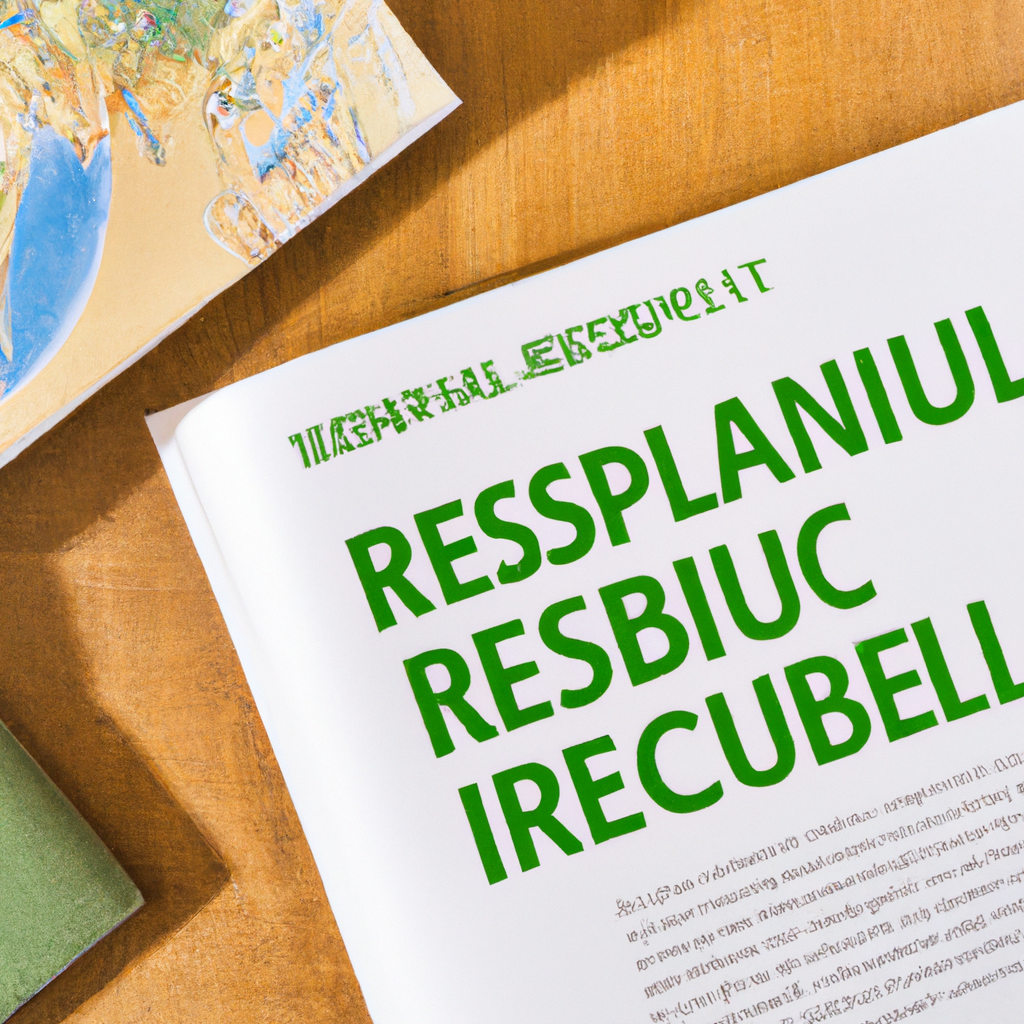In a world where wanderlust runs rampant and the desire for new experiences grows ever stronger, the importance of responsible travel cannot be underrated. As the sun sets on the old paradigm of blissful ignorance, a new era of mindfulness emerges. Welcome to the world of eco-friendly practices and their powerful impact on our beloved planet.
Gone are the days when travelers simply reveled in the beauty of untouched landscapes, ignorant of the consequences of their actions. The paradigm shift calls for an understanding of the true impact our footprints leave behind, both visible and invisible. It beckons us to embark on journeys that not only satiate our wanderlust but also nurture, protect, and sustain the delicate ecosystems that surround us.
Responsible travel embraces a mindset of environmental stewardship that transcends mere admiration for nature’s wonders. It requires adopting practices that minimize harm and maximize preservation, without compromising the essence of our explorations. With each step we take, we have the power to breathe life into the concept of eco-tourism, paving the way for a future where travel and sustainability go hand in hand.
So, what lies at the heart of responsible travel? It spans a vast spectrum of eco-friendly practices that guide us towards making conscious choices while venturing into the unknown. From reducing carbon footprints by opting for greener modes of transportation, to supporting local communities and embracing their cultural heritage, responsible travel paints a picture of compassion and respect for the world we share.
Join us on a remarkable journey where we unravel the secrets behind responsible travel, exploring the profound impact it has on our planet and, in turn, how it enriches our own experiences. Discover the breathtaking destinations that have triumphed in their commitment to sustainability, the innovative practices travelers adopt to preserve wildlife and landscapes, and the cascading effects these endeavors have on local economies.
Together, we embark on a quest to redefine the meaning of travel, evolving from mere consumers to conscious global citizens. By amplifying the call for eco-friendly practices and their profound impact, we can inspire a seismic shift in the way we explore and engage with the world. It is our duty to ensure that future generations can immerse themselves in the beauty we have been so fortunate to witness.
So pack your bags, open your mind, and prepare for an enchanting exploration into the world of responsible travel. Let us embark on a journey that not only captivates our spirits but also safeguards the very essence of our planet’s wonders.
1. Nurturing the Planet: The Promise of Responsible Travel
In today’s fast-paced world, responsible travel has become more critical than ever. With the rise of global warming, deforestation, and pollution, it is our responsibility to nurture the planet and take steps towards sustainable tourism. By choosing to travel responsibly, we can minimize our impact on the environment and support local communities.
One of the key aspects of responsible travel is reducing our carbon footprint. This can be achieved by opting for eco-friendly transportation methods such as cycling, walking, or using public transport. Not only does this help to reduce greenhouse gas emissions, but it also allows travelers to immerse themselves in the local culture and truly experience the destination.
Responsible travelers also ensure they make ethical choices when it comes to accommodation. Staying in eco-friendly hotels and resorts that prioritize sustainability practices is a great way to support environmental initiatives. These establishments often implement energy-saving measures, waste management systems, and promote organic and locally sourced products.
Supporting local communities is another crucial aspect of responsible travel. By engaging in community-based tourism, travelers can contribute to the socio-economic development of the destination. This can involve participating in local traditions, purchasing handicrafts directly from artisans, or dining at family-owned restaurants. By doing so, travelers not only have a positive impact on the local economy but also gain a deeper understanding of the local culture and way of life.
Choosing responsible travel also means respecting the natural environment. Travelers should be mindful not to disturb local ecosystems or endanger wildlife. Simple actions like refraining from littering, not removing natural souvenirs, and following designated paths and trails can significantly minimize the negative impact on delicate ecosystems.
In conclusion, responsible travel holds the promise of nurturing our planet. By adopting sustainable practices, reducing our carbon footprint, supporting local communities, and respecting the environment, we can make a positive difference in the places we visit. Let’s strive to become responsible travelers and ensure a bright and sustainable future for our planet.

2. Footprints Left Behind: Exploring the Environmental Impact of Travel
As globetrotters, we embark on thrilling journeys to discover new places, create lasting memories, and immerse ourselves in diverse cultures. However, it’s crucial to recognize that our adventures can leave behind a profound environmental impact. By examining the footprints we leave behind, we can take responsible actions to protect the planet for future generations.
1. Carbon Emissions: Travel by air, road, or sea contributes significantly to greenhouse gas emissions. The burning of fossil fuels for transportation releases carbon dioxide into the atmosphere, leading to climate change. To mitigate this impact, consider alternative modes of travel like trains that have lower carbon footprints. Moreover, supporting airlines that prioritize sustainability and investing in carbon offset programs can help lessen the environmental burden of our journeys.
2. Wildlife Disruption: Our presence in natural habitats can disrupt ecosystems and negatively affect wildlife. Trampling fragile flora, increasing noise pollution, and leaving behind waste can disturb the delicate balance that maintains biodiversity. It’s essential to travel responsibly by adhering to designated paths, refraining from feeding or getting too close to wild animals, and always disposing of waste properly. These measures help preserve the habitats we explore and protect the countless species that call them home.
3. Plastic Pollution: The convenience of single-use plastics often tempts travelers, leading to an alarming accumulation of waste in popular tourist destinations. Plastic bottles, bags, and straws end up polluting the oceans, harming marine life and ecosystems. You can contribute to tackling this issue by using reusable water bottles, shopping bags, and straws made from sustainable materials. Avoiding excessive packaging and participating in beach clean-ups can also make a significant difference in reducing plastic pollution.
4. Cultural Preservation: Traveling allows us to experience the richness of diverse cultures. However, our actions as tourists can inadvertently contribute to the erosion of local traditions and heritage. It’s essential to respect the customs, beliefs, and values of the communities we visit. Engaging with local businesses, supporting sustainable tourism initiatives, and learning about the history and culture of a destination promotes cultural preservation and ensures that future generations can enjoy the authenticity and uniqueness of each place.
3. From Conservation to Connection: Embracing Eco-Friendly Practices in Tourism
As tourism continues to grow at an unprecedented rate, it is crucial for both travelers and industry professionals to acknowledge and embrace eco-friendly practices. Conservation efforts alone are no longer sufficient; instead, we must strive for a deeper connection to the environment.
Eco-friendly tourism embodies the idea of treading lightly and leaving no trace. It means minimizing the negative impact on wildlife, ecosystems, and local communities, while maximizing the positive contributions we can make. By adopting such practices, we can embark on a journey towards a more sustainable future.
So, what does it mean to shift from conservation to connection? It means moving beyond mere observation and actively engaging with our surroundings. It means forging a symbiotic relationship with nature, where we not only learn from it but also give back in return.
One way to achieve this connection is by supporting local conservation initiatives. By visiting and contributing to eco-friendly projects, we can help protect fragile ecosystems, endangered species, and cultural heritage sites. This may include volunteering with sea turtle conservation programs, participating in reforestation efforts, or supporting local sustainable farms.
Moreover, it’s important to engage in responsible wildlife encounters. Instead of participating in activities that exploit animals, such as riding elephants or swimming with dolphins in captivity, we can opt for experiences that promote their well-being. Observing whales and dolphins in their natural habitats or visiting ethical elephant sanctuaries are examples of sustainable alternatives that allow us to appreciate these magnificent creatures without causing harm.
Embracing eco-friendly tourism practices also extends to our day-to-day behaviors. Choosing accommodations that prioritize sustainability, such as eco-lodges or hotels with green certifications, can make a significant difference. Similarly, opting for locally-sourced and organic food options not only supports local communities but also reduces the carbon footprint associated with long-distance transportation of goods.
Ultimately, embracing eco-friendly practices in tourism is about building connections: connections between travelers and the environment, connections between local communities and their natural resources, and connections between people who share a common goal of preserving our planet. Together, we can pave the way for a more sustainable and harmonious future.
4. Beyond Wanderlust: How Responsible Travel Can Change the World
Traveling the world is a transformative experience that opens our eyes to new cultures, landscapes, and perspectives. But what if we told you that travel could also have a positive impact on the world? Responsible travel, also known as sustainable or ethical travel, is a growing movement that aims to minimize our negative impact on the environment and local communities while maximizing the benefits.
Beyond fulfilling our wanderlust, responsible travel can be a force for good, creating a ripple effect that can change the world. Here are some ways in which responsible travel can make a difference:
- Preserving the Environment: One of the key principles of responsible travel is minimizing our environmental footprint. By choosing eco-friendly accommodations, supporting sustainable tourism initiatives, and practicing Leave No Trace principles, we can help preserve natural habitats and protect fragile ecosystems.
- Supporting Local Communities: Responsible travelers understand the importance of supporting local economies and communities. By staying in locally-owned accommodations, eating at neighborhood restaurants, and purchasing locally-made products, we can contribute directly to the well-being of the communities we visit.
- Promoting Cultural Exchange: Responsible travel embraces cultural diversity and fosters understanding between different societies. By engaging with local people, respecting their customs, and learning about their traditions, we can promote cultural exchange and break down barriers.
- Empowering Women and Marginalized Communities: Travel has the power to uplift marginalized communities, particularly women, by creating economic opportunities. Responsible travelers can support social enterprises, fair trade initiatives, and community-based tourism projects that empower these communities and help alleviate poverty.
- Encouraging Conservation Efforts: Responsible travelers can support conservation efforts by visiting national parks and protected areas, where entrance fees and eco-tourism grants contribute to conservation projects. Additionally, participating in wildlife conservation programs or volunteering with local organizations can have a direct impact on preserving endangered species and habitats.
By embracing responsible travel practices, we have the power to change the world, one trip at a time. Every choice we make – from the destinations we choose to the activities we engage in – can have a lasting impact. So, let us explore the world with a mindset of responsibility, leaving behind footprints that not only fulfill our wanderlust but also make the world a better place for future generations.
By becoming an advocate of responsibility through eco-friendly travel, you are contributing to a better future for all. So why not get out and explore, with conscious consideration of the environment and social impact of your journey? Nature’s landscapes and people-driven culture continue to provide us with so much inspiration and joy, let’s continue to protect them.




